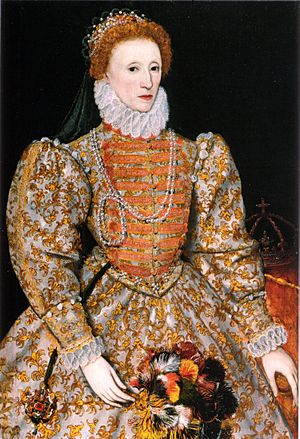On Monsieur's Departure facts for kids
"On Monsieur’s Departure" is a famous poem from the time of Queen Elizabeth I. Many people believe Queen Elizabeth I herself wrote it. The poem seems to be about her feelings when talks about her marriage to Francis, Duke of Anjou did not work out. Some also think it might be about her strong feelings for Robert Dudley, 1st Earl of Leicester.
Queen Elizabeth I was very smart and well-educated for her time. She wrote several poems that often reflected her own life and feelings. This was common in an era when "courtly love" was a popular idea in Europe. "On Monsieur’s Departure" is a poem where the speaker feels sad because their love is not returned.
Contents
The Poem's History
This poem was never officially published during Queen Elizabeth's lifetime. It was found much later, around 1630, in an old handwritten book. In that book, it was simply called "Elizabeth: On Monsieur's Departure." Because of this, we are not entirely sure if it was truly about Francis, Duke of Anjou.
The Full Poem

I grieve and dare not show my discontent;
I love, and yet am forced to seem to hate;
I do, yet dare not say I ever meant;
I seem stark mute, but inwardly do prate.
I am, and not; I freeze and yet am burned,
Since from myself another self I turned.
My care is like my shadow in the sun --
Follows me flying, flies when I pursue it,
Stands, and lies by me, doth what I have done;
His too familiar care doth make me rue it.
No means I find to rid him from my breast,
Till by the end of things it be suppressed.
Some gentler passion slide into my mind,
For I am soft and made of melting snow;
Or be more cruel, Love, and so be kind.
Let me or float or sink, be high or low;
Or let me live with some more sweet content,
Or die, and so forget what love e'er meant.
How the Poem is Built
The poem has three sections, called sestet stanzas. Each stanza has six lines. The rhythm of the poem follows a pattern called iambic pentameter. This means each line has ten syllables, with an alternating pattern of unstressed and stressed sounds. The words at the end of the lines rhyme in a specific way: the first line rhymes with the third, the second with the fourth, and the last two lines rhyme with each other (ABABCC).
How it Compares to Other Poems
"On Monsieur’s Departure" is different from another poem of the same time, "My Lute, Awake!" by Sir Thomas Wyatt. Both poems talk about unrequited love, which means loving someone who does not love you back. However, they show this feeling in different ways.
In Elizabeth's poem, the speaker feels responsible for the pain and understands the other person's feelings. But in "My Lute, Awake!", the writer puts all the blame on the woman he loves and does not wish her well.
Sources
- Applebee, Arthur N., et al. The Language of Literature- British Literature. Boston: McDougal Littell, 2000.
 | Aaron Henry |
 | T. R. M. Howard |
 | Jesse Jackson |

